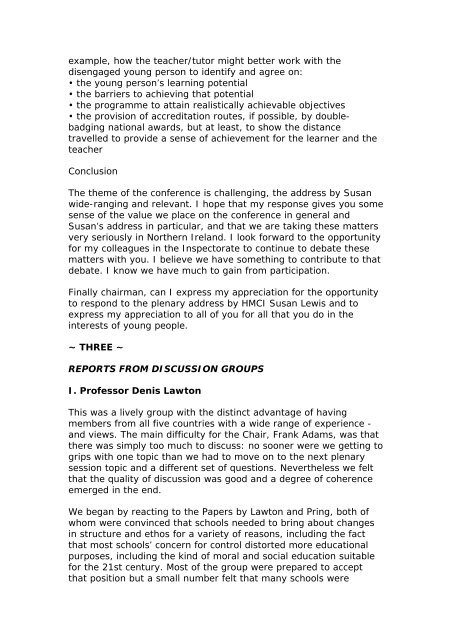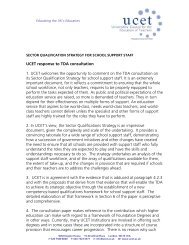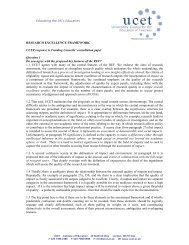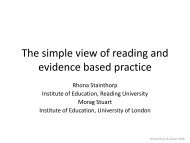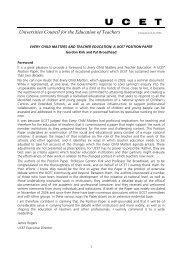The School Curriculum Ten Years Hence - UCET: Universities ...
The School Curriculum Ten Years Hence - UCET: Universities ...
The School Curriculum Ten Years Hence - UCET: Universities ...
Create successful ePaper yourself
Turn your PDF publications into a flip-book with our unique Google optimized e-Paper software.
example, how the teacher/tutor might better work with the<br />
disengaged young person to identify and agree on:<br />
• the young person’s learning potential<br />
• the barriers to achieving that potential<br />
• the programme to attain realistically achievable objectives<br />
• the provision of accreditation routes, if possible, by doublebadging<br />
national awards, but at least, to show the distance<br />
travelled to provide a sense of achievement for the learner and the<br />
teacher<br />
Conclusion<br />
<strong>The</strong> theme of the conference is challenging, the address by Susan<br />
wide-ranging and relevant. I hope that my response gives you some<br />
sense of the value we place on the conference in general and<br />
Susan’s address in particular, and that we are taking these matters<br />
very seriously in Northern Ireland. I look forward to the opportunity<br />
for my colleagues in the Inspectorate to continue to debate these<br />
matters with you. I believe we have something to contribute to that<br />
debate. I know we have much to gain from participation.<br />
Finally chairman, can I express my appreciation for the opportunity<br />
to respond to the plenary address by HMCI Susan Lewis and to<br />
express my appreciation to all of you for all that you do in the<br />
interests of young people.<br />
~ THREE ~<br />
REPORTS FROM DISCUSSION GROUPS<br />
I. Professor Denis Lawton<br />
This was a lively group with the distinct advantage of having<br />
members from all five countries with a wide range of experience -<br />
and views. <strong>The</strong> main difficulty for the Chair, Frank Adams, was that<br />
there was simply too much to discuss: no sooner were we getting to<br />
grips with one topic than we had to move on to the next plenary<br />
session topic and a different set of questions. Nevertheless we felt<br />
that the quality of discussion was good and a degree of coherence<br />
emerged in the end.<br />
We began by reacting to the Papers by Lawton and Pring, both of<br />
whom were convinced that schools needed to bring about changes<br />
in structure and ethos for a variety of reasons, including the fact<br />
that most schools’ concern for control distorted more educational<br />
purposes, including the kind of moral and social education suitable<br />
for the 21st century. Most of the group were prepared to accept<br />
that position but a small number felt that many schools were


